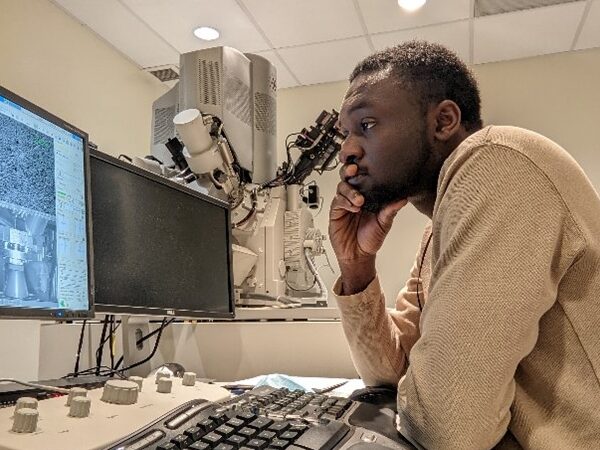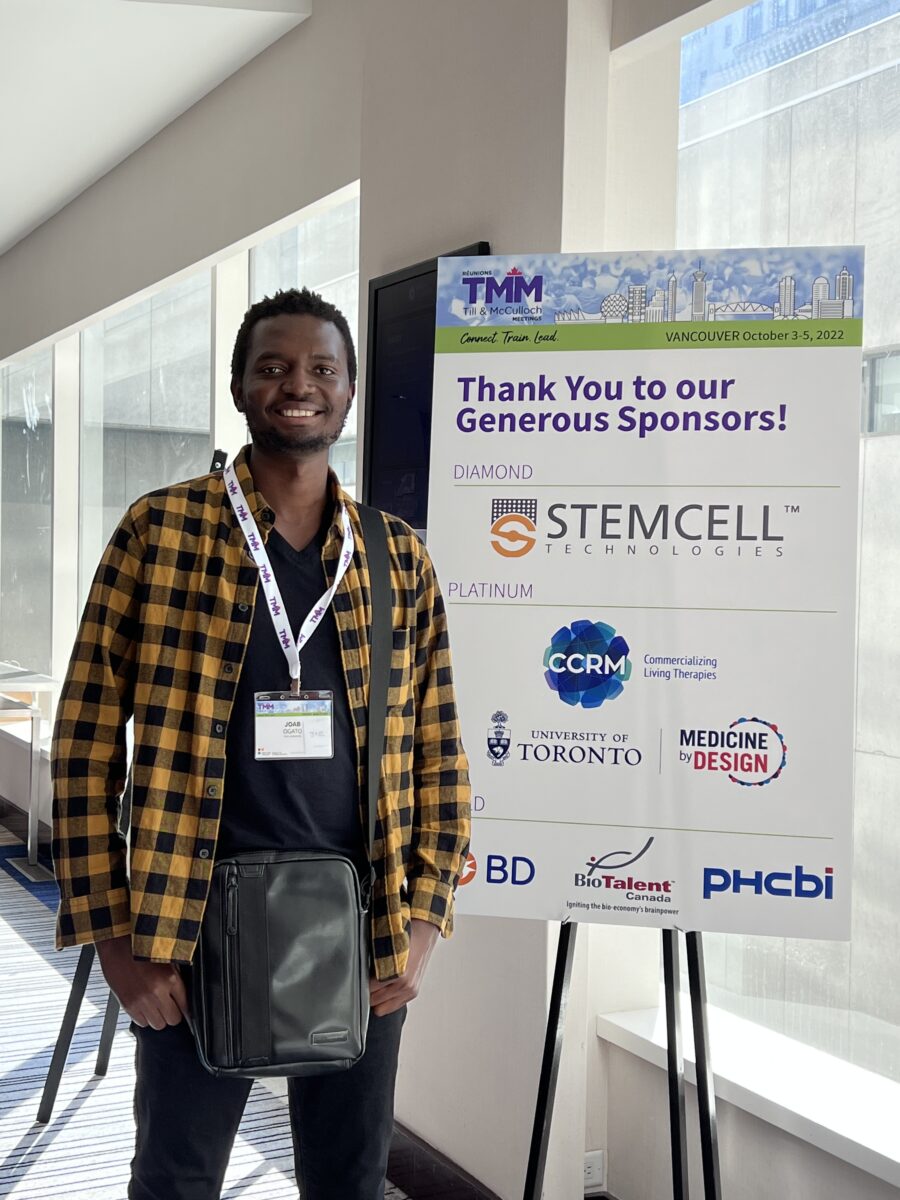Graduate students at Lassonde are personifying Black Excellence in Mechanical Engineering
Tags:
Get to know Joseph Agyapong and Joab Ogato through their research and passion for empowering the Black community in STEM.
Joseph Agyapong is currently a PhD student at Lassonde who is focused on research in metal-additive manufacturing of advanced materials. When he first started studying Engineering at the Kwame Nkrumah University of Science and Technology in Ghana, Agyapong was fixed on pursuing a degree in Electrical Engineering. “I don’t know what happened, but I ended up in Mechanical Engineering,” says Agyapong. Despite his original intentions, as he completed his bachelor’s degree in Mechanical Engineering, he unexpectedly discovered a passion for research and teaching.
Agyapong’s undergraduate education taught him a valuable lesson that would shape his future, “If you confine yourself to one goal, you will never know what else is out there.” Shortly after earning his bachelor’s degree, he enrolled in the master’s Mechanical Engineering program at York University’s Lassonde School of Engineering and began conducting research with Professors Alex Czekanski and Solomon Boakye-Yiadom.

Joab Ogato, who is also a Mechanical Engineering PhD student at Lassonde, found that his path was driven by his environment. Ogato was born and raised in Kenya, where he recalls being frustrated with the lack of access to sufficient medical care, which affected his family and loved ones. This served as motivation for him to make an impact, starting with his education. He pursued undergraduate studies across multiple disciplines including mechatronics and robotics engineering, biomedical engineering, biology and chemistry – he even received a PhD in instructional design. In addition to his education, Ogato developed professional experience in biomedicine through various industry opportunities.

In search of a research opportunity that would combine his experience and interests, Ogato enrolled at Lassonde where he met Professor Terry Sachlos. “We met in the corridor, had a great conversation, he quickly recruited me, and I’ve been working with him ever since,” says Ogato.
Although both Agyapong and Ogato are Mechanical Engineering students who completed their Master’s degree at Lassonde, with multiple shared passions – including standing up for Black professionals and youth in STEM – their research could not be more different. “I like that Mechanical Engineering is broad; it gives you the chance to have many different opportunities,” says Agyapong.
Agyapong is focused on the fabrication of advanced metallic alloys using metal 3D printing (very hard materials), with the goal of creating innovative materials for structural, aerospace and automotive applications. On the other hand, Ogato’s research is focused on biomaterials and tissue engineering (very soft materials), with the goal of translating research findings to clinical applications that can save patients’ lives.


“I’m mostly focused on high entropy alloys, this is a brand-new field, so we have to understand the fundamentals… we are basically creating a new science,” says Agyapong. High entropy alloys demonstrate enhanced properties and pose a solution to the increasing demand for new alloys and their structural applications. Agyapong is currently working on the formulation and 3D printing of his own high entropy alloy, as well as investigating ways to improve the properties of traditional alloys, such as steel and aluminium. Ultimately, he would like to continue his journey and become a research professor at a university.
Like Agyapong, Ogato is doing impactful research that aims to make a change in his field. “I want to create something groundbreaking,” says Ogato as he describes his work relating to 3D printing blood vessels. 3D printing has been successful in creating several types of functional tissues, but not thick tissue such as bone marrow, because thick tissue needs a blood supply to function. To solve this issue, Ogato is developing a scaffold with an internal microarchitecture that can support the growth of blood vessels, which could then be used to create functional organs. He is currently focused on using these scaffolds to develop bone marrow for the treatment of patients with Acute Myeloid Leukemia. “Instead of getting a bone marrow transplant, what if we could replace the patient’s sick bone marrow with their own regenerated bone marrow?” says Ogato. “We could possibly cure cancer or at least bring the cure one step closer.”


With a strong passion, drive and endless dedication, Agyapong and Ogato are very familiar with hard work and discipline. The two PhD students share an ambitious energy that has been recognized by established members of their respective fields, providing them with meaningful opportunities.
When Agyapong first came to Canada as an international student, he was shocked by the bold approach that students had when fighting for academic and career opportunities. “In Ghana, that’s not something I’m used to,” says Agyapong. Nonetheless, he decided to adapt to his new environment and take authority over his future. Agyapong quickly established a momentum that resulted in achievements such as the early completion of his master’s degree and publication of multiple scholarly articles. He was also a recipient of York University’s Academic Excellence Fund. In addition, Agyapong’s dedication as a teaching assistant at Lassonde has allowed him to teach as a primary lecturer on various occasions, ultimately supporting his goal of becoming a professor.
Ogato’s goal-driven efforts have resulted in numerous achievements and opportunities. For one, he is a recipient of the prestigious IBET fellowship, which fosters equitable and inclusive research environments to increase the presence of Indigenous and Black students in STEM. “I’m grateful that Lassonde sees the need for representation,” says Ogato. This fellowship has given Ogato the freedom to concentrate on his research, without having to worry about financial burdens. He was also awarded the NSERC CREATE Grant which encourages networking within the biomedical community and has allowed for research opportunities with distinguished institutions, such as the Sunnybrook Health Sciences Centre.
Though both students have received academic and career support from many sources, Agyapong and Ogato express a special form of gratitude for the support they have received from their PhD supervisors. From academic and career development to emotional and mental support, their supervisors have played a role in their lives beyond what was expected.
“With all they have done for me, they are not just supervisors anymore,” says Agyapong. Professor Czekanski and Professor Boakye-Yiadom have not only provided academic and career development opportunities for Agyapong, but they have become pivotal mentors in his life.
Agyapong explains that Professor Czekanski will never allow a problem to persist; whether it is related to his research, career or well-being, Professor Czekanski will commit to finding a solution. Additionally, Agyapong’s relationship with Professor Boakye-Yiadom has been very important throughout his journey, thanks to their shared experience as Black engineers. “For Solomon, every step should be impressive – he always finds ways to improve our work and urges us to stay healthy and well,” says Agyapong. “I know he pushes me because he wants to prepare me for what I might face as a Black professor.”
Ogato also shares deeply positive sentiments about his PhD supervisor, Professor Sachlos. He describes Professor Sachlos as an extremely talented and knowledgeable researcher who supports independence, learning and collaboration in his lab environment. “He’s a superb supervisor,” says Ogato. “Not only is he extremely talented, he’s a great teacher too, he wants you to learn by doing.” Ogato also recalls being particularly grateful when Professor Sachlos approached him to discuss his experience and needs as a Black student, ensuring he is supporting him in every way he can.
Though Agyapong and Ogato have individual journeys, passions and objectives, they acknowledge a shared responsibility in their journeys: to change the narrative for Black students and professionals in STEM. According to a Statistics Canada Report, only 16% of post-secondary STEM credentials are received by Black students. This underrepresentation is part of what discourages the Black community from pursuing careers in STEM, while creating a more challenging environment for those who are currently in STEM fields.
“What someone is capable of has nothing to do with where they come from,” says Agyapong. “If you put a magnifying glass on someone’s background or gender, you can’t identify their potential.” Agyapong firmly believes that Black students are highly capable of succeeding in STEM fields, but stereotypes and systemic barriers are pushing them away from these opportunities. To drive change, Agyapong works with the Society of Manufacturing Engineers, as well as the Lassonde Research Summer and Mentorship Program, where he aims to inspire young Black students in STEM through teaching and mentorship.
Ogato provided similar insights as he described the need for Black representation in STEM, “Black representation is important, everyone should see that there are opportunities available to them,” says Ogato. “We need to bring our stories to the medical technology space, otherwise who will speak up for Black people? Who will create things for Black people?” Ogato has taken on an important role as an advocate for the Black community by using his experience in biomedical engineering to drive change. He is particularly interested in using his knowledge to address discriminatory healthcare practices that lead to cases of inadequate medical care. Studies show that these practices are rooted in faulty medical theories and continue to persist in medical settings today. Ogato also aims to bring his educational experience back to Africa, where he intends to work with other skilled individuals to transform biomedical technology. “I am proud to be a representative Black man who wants to change STEM and make a positive impact in the world,” says Ogato.
With their passion, dedication, and intelligence, these exemplary graduate students at Lassonde continue to demonstrate Black excellence in STEM and encourage others to follow in their footsteps.